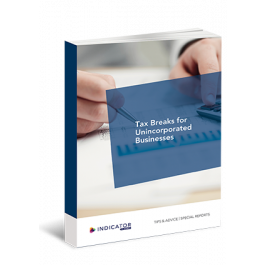Tax Breaks for Unincorporated Businesses
A Tips & Advice Special Report about...
In a nutshell
This Special Report looks at the key events in the life of a business and explains in jargon-free English the steps to take to maximise tax efficiency. It brings together tried and tested strategies plus the latest HMRC practice and legislation. It’s all you need to take advantage of the available tax reliefs.
In detail
Whether you’ve just started your business, have an established trade or are winding down to retirement, the tax system includes special rules for sole traders and partnerships. As a business owner, understanding these is vital to ensure you make the most of the tax breaks without falling foul of HMRC.
Our Special Report explains:
- How and when to register your business with HMRC
- Accounting periods and how to change them to your advantage
- Which costs you can and can’t claim tax deductions for
- The "cash basis" and "simplified deductions"
- How VAT works and when to register
- Bringing in or changing business partners
- Getting the best tax result from selling or transferring your business
You’ll find plenty of worked examples to back up our real-world advice plus a stack of practical documents and Excel calculators.
We've created this Tips & Advice Special Report especially for...
Business owners, sole traders or those in partnerships that need:
- An overview of the available tax reliefs for their business
- To know how to make the most of the available tax breaks
Tax advisors and accountants that want to:
- Advise their clients in the most tax-effective ways
You'll get the following free extras with this Tips & Advice Special Report...
An online service with ready-to-use documents
- To immediately apply our advice and solutions in practice
- That you can easily adapt to suit your own requirements
In this Tips & Advice Special Report you'll read about...
1. Before business begins
1.1. Introduction
1.2. What are the tax rules for pre-trading expenses?
1.3. Can a deduction be claimed for personal expenses?
1.4. How much tax deduction can I claim?
1.5. How do tax deductions differ for capital pre-trade expenses compared with day-to-day costs?
1.6. Does the pre-trade rule apply to all expenses?
1.7. What about services I pay for before trading?
1.8. What about VAT on pre-trade expenses?
1.9. What’s the general rule for reclaiming pre-registration VAT?
1.10. What are the VAT time limits?
1.11. Does non-business use before registration affect the amount of VAT reclaimable?
1.12. Is there a special rule for continuous supplies I purchase pre-registration?
1.13. Are there any NI issues to consider for pre-trading expenses?
1.14. Example income tax and VAT for pre-trade expenditure
1.15. Where can I find the legislation and HMRC’s guidance on pre-trading and pre-registration expenses?
2. When trade commences
2.1. Introduction
2.2. Do I need to tell HMRC that I’m in business?
2.3. Is there a special procedure for partnerships?
2.4. What happens after I’ve notified HMRC?
3. When the business is running
3.1. Introduction
3.2. How do I work out profits?
3.3. Who can use cash accounting?
3.4. Are any businesses excluded from the cash basis?
3.5. How do I elect to use the cash basis?
3.6. What is the trading allowance?
3.7. Can I choose the date to which I prepare my business accounts?
3.8. What if my business makes losses in the early years?
3.9. Can I use business losses to reduce tax on my other income?
3.10. Can I use business losses against future profits?
3.11. How do business losses affect my Class 4 NI contributions bill?
3.12. Can I use business losses to reduce my capital gains tax bill?
4. Tax deductions
4.1. Introduction
4.2. What are simplified tax deductions?
4.3. What can I claim for costs relating to working from home?
4.4. As a partner are there special rules for deducting personal business expenses?
4.5. Can I reclaim VAT paid on the cost of working at home?
4.6. Can I get a tax deduction if I pay my spouse, partner or other family member?
4.7. What is the annual investment allowance?
4.8. What is the small pool deduction for CAs?
4.9. What are short-life assets and how can I claim CAs for them?
4.10. What tax deductions are allowed for expenditure on IT equipment and software?
4.11. What tax deductions are allowed for the cost of creating and running a website?
4.12. Can I claim for the cost of work-related training?
4.13. Can I claim a tax deduction or reclaim VAT on entertaining costs?
4.14. Are the costs of business networking events tax deductible?
4.15. Can I claim a deduction for the cost of business gifts?
4.16. What is know-how and when can I claim tax deductions for it?
4.17. Can I claim a tax deduction when I buy patents?
5. Can I claim a tax deduction for a fine or penalty?
5.1. If I need special clothing for my work can I claim a deduction for the cost?
5.2. Is a tax deduction allowed for interest on money I borrow for the business?
5.3. What’s the tax position if I borrow money so I can withdraw profits or capital from my business?
5.4. What about interest paid on personal loans I used to invest in my business partnership?
5.5. Are the costs of obtaining finance tax deductible?
5.6. What types of insurance premium are tax deductible?
6. Tax deductions for business travel
6.1. What can I claim a tax deduction for when I travel on business?
6.2. What if I have more than one business or business base?
6.3. If I use my own vehicle for business what tax deductions can I claim?
6.4. How do I work out CAs for cars?
6.5. How is taxable profit calculated for my final period as a partner?
6.6. Can I reclaim VAT paid when I buy a car for use in my business?
6.7. Can I reclaim VAT for motor running costs relating to business journeys?
6.8. What about VAT paid on fuel relating to business journeys?
7. When the business ceases
7.1. Introduction
7.2. How is profit calculated for the final period of trading?
7.3. What if my business makes losses in the final period of trading?
7.4. I transferred my business to a company - can I use losses from the business to reduce tax on the company’s income?
7.5. What if I have business expenses after my business has ceased?
7.6. How are tax deductions for post-cessation expenses allowed?
7.7. Can I reclaim VAT on expenses after I have deregistered?
7.8. If I sell my business how will I be taxed on what I receive?
7.9. What conditions must be met for business asset disposal relief?
7.10. What’s the tax position if I sell my share in a partnership?
7.11. What’s the tax position if I give away part of my share in a partnership?
8. Appendices
8.1. Appendix A - Capital goods
8.2. Appendix B - Capital allowances for integral features
8.3. Appendix C - Business accounting and tax basis periods - the position prior to 6 April 2023
8.4. Appendix D - Doubly taxed profits and overlap relief - prior to 6 April 2023
8.5. Appendix E - tax basis periods for 2023/24 and beyond
You can choose from the following options...
Paper
- The hard copy version
- Keep it on your desk or use it whenever you're offline
Digital
- The PDF-version
- Delivered to your inbox
Take a look at your options below.
Special subscribers' offer
£90.00
£70.00
Only if you already have a subscriptionStandard offer
£90.00
Special subscribers' offer
£90.00
£70.00
Only if you already have a subscriptionStandard offer
£90.00

Got a question? Call Customer Services
(01233) 653500


 (01233) 653500
(01233) 653500 







